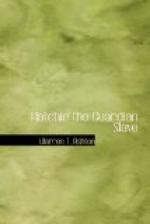“’Pon my soul it did, thin,—it makes me happy whin sorra thing else in the wide world will comfort me,” replied Pat.
“But that an’t nateral happiness; it an’t the sort that comes of doin’ good to your feller-creturs.”
“It sinds throuble away—what else is happiness?”
“But how do you feel arterwards? That’s the pint.”
“Arrah! bad enough, sure. Yous have the betther of me there.”
“Then leave it off, Partrick,” responded Uncle Nathan, drawing the pledge from his pocket. “Sign the pledge, and you are safe.”
But we need not follow Uncle Nathan in his reformatory lucubrations. Pat signed the pledge; but whether he had an appreciating sense of the restraint he imposed upon his appetite we cannot say. Uncle Nathan thought him saved from his cups, and rejoiced accordingly. Perhaps, if he had looked a little closer, he might have suspected an interested motive on the part of Pat. He saw none, and, feeling secure in the present victory, he admonished his disciple “to stick to it as long as he lived.”
“’Pon me word, I will, thin,” replied Pat. “I see yous are a gintleman, if yous don’t look jist like one. Now, do you see, Mr. Binson, you are jist the man I am looking for, this last six hours.”
“Why so, Partrick—what do you mean?” said Uncle Nathan, mystified by the sudden change of manner in the new convert.
“Hould aisy a bit, for I’d like to hould a private correspondence wid yous. Will ye jist come to the hurricane deck, till I tells yous all about it?”
“Sartain,” replied Uncle Nathan, his curiosity fully excited.
As soon as they reached a deserted portion of the promenade deck, Pat, after satisfying himself there were no listeners near, commenced, with an air of grave importance, his story.
“Whisht now, and draw near,” said he. “Can yous keep a sacret?”
“Well, I think I could, if it was an honest one.”
“Faix, thin, it is an honest one. Sure yous come from the North, and don’t belave in keeping the naigers in bondage?”
“To be sure not.”
“Well, then, would yous help a naiger out of throuble, if yous could as well as not?”
“I sartainly wish ’em well; but the Scripture says ‘Honor the king,’ which means nothin’ more nor less than ‘obey the laws.’ Arter all, though, perhaps we ought not to mind wicked laws.”
“Musha bad luck to your raysoning! Sure I’m no docthor, to blarney over the matther. Will yous kape the sacret?” asked Pat, a little excited, and somewhat disappointed to find his auditor lukewarm in “the cause.”
“Sartain; tell your story, and, if I can’t do you any good, I won’t do you any harm.”
“That’s the mon for me!” replied Pat, slapping Uncle Nathan familiarly on the back. “Now, do you see, there’s a naiger on this boat, that wants a frind.”
“A friend!” said Uncle Nathan, with some doubt, as he reflected on the conflict between the claims of humanity and the stringent laws of the slave states.




